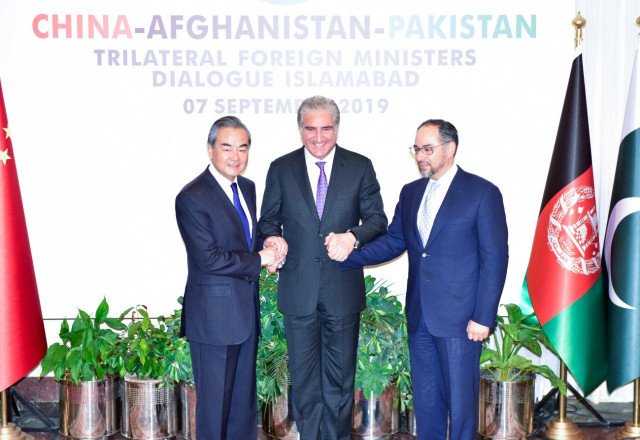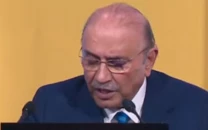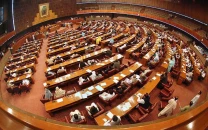Imminent Afghan deal: Call for 'orderly' troop pullout
Pakistan, China and Afghanistan foreign ministers discuss counter-terror efforts, BRI cooperation

Foreign ministers of Pakistan, China and Afghanistan display solidarity at a trilateral summit in Islamabad on Saturday. PHOTO: EXPRESS
The agreement reached among three countries after Foreign Minister Shah Mehmood Qureshi hosted his Chinese and Afghan counterparts in the federal capital to discuss the Afghan peace efforts, counterterrorism cooperation, and other issues.
Chinese Foreign Minister Wang Yi and Afghan Foreign Minister Salahuddin Rabbani travelled to Islamabad for the trilateral dialogue initiated in 2017 for better understanding among three countries on a range of issues particularly the Afghan peace process.
Foreign Minister @SMQureshiPTI held a bilateral meeting with his Chinese counterpart H.E. Wang Yi at MoFA. Both leaders discussed matters of mutual interests and cooperation in various fields. pic.twitter.com/PizUUd1Jkq
— Ministry of Foreign Affairs - Pakistan (@ForeignOfficePk) September 7, 2019
The three-way talks were held against the backdrop of an imminent peace deal to be signed by the US and Afghan Taliban after months of negotiations in Doha. However, the Afghan government has expressed concerns over the likely peace deal, fearing that the accord may exclude other Afghan players.
The issue, according to officials, was discussed by the foreign ministers of Pakistan, Afghanistan, and China. In a joint statement issued after the trilateral meeting, there was an emphasis on intra-Afghan dialogue, including direct negotiations between the Afghan government and Taliban, something the Ghani administration had been demanding for many months.
The joint statement appears to suggest that Pakistan and China endorsed the Afghan government's perspective. Even more significant was the unanimous condemnation by all three sides of the recent spate of Taliban attacks in Kabul, Kunduz, Baghlam and Farah.
The three foreign ministers, according to the joint statement, said they were closely following recent developments in the regional situation while reiterating their support for a politically-negotiated settlement of the conflict in Afghanistan.
In this regard, they took note of the talks between the US and the Taliban. They expressed the hope that intra-Afghan negotiations, including direct negotiations between the Islamic Republic of Afghanistan and the Taliban, begin soon and lead to full cessation of violence, bringing a lasting peace for the people of Afghanistan.
They particularly underlined the need for an inclusive, Afghan-led and Afghan-owned peace process leading to a comprehensive agreement for durable peace and stability in Afghanistan.
"Based on respect for the will of the Afghan people, while appreciating the efforts made by the Government of Afghanistan, China and Pakistan expressed their continued support for Afghanistan's peace and reconciliation process as well as for the efforts towards reconstruction and economic development in the country."
Speaking at a joint news conference, both Qureshi and Wang Yi hoped that US-Taliban peace deal would lead to intra Afghan dialogue. Afghan Foreign Minister Rabbani, however, questioned the seriousness of the Taliban for having any peace deal.
Rabbani pointed out that the Taliban have not shown "genuineness" to the peace process given the fact they have continued with the terrorist attacks, targeting all segments of Afghan society.
While he sounded upbeat of Pak-Afghan bilateral ties, Rabbani said much would depend on the "positive steps" to be taken by Pakistan to reduce violence in Afghanistan.
Qureshi, in his remarks, stressed that Pakistan had achieved significant success against terrorist groups and underlined more steps by all sides to ensure peace. He added, "The fact that Rabbani was in Islamabad showed that the relationship between the two countries was improving".
The talks in Islamabad also focused on security cooperation as well as regional connectivity through China's Belt and Road Initiative (BRI). The three sides noted with satisfaction the progress made under the trilateral cooperation since the 2nd Dialogue held in Kabul, on December 18, 2018.
The three foreign ministers reiterated their resolve to further deepen various strands of trilateral cooperation. They agreed to continue their joint efforts for building political mutual trust and supporting reconciliation, regional peace, and stability, development cooperation and connectivity, security cooperation and counter-terrorism as key areas of the trilateral cooperation.
The three sides reaffirmed their commitment to further strengthening their relations, exploring new ways of deepening cooperation, including advancing connectivity under the Belt and Road Initiative, Regional Economic Cooperation Conference on Afghanistan (RECCA) and other regional economic initiatives.
The three sides agreed to explore 'China-Afghanistan-Pakistan plus' cooperation, as well as working towards promoting trade and connectivity projects between Afghanistan and Pakistan, such as Kabul-Peshawar Motorway.
The three sides welcomed the progress made on the implementation of projects agreed under the China-Afghanistan-Pakistan Practical Cooperation Dialogue (CAPPCD). They agreed to continue cooperation in the fields of economic development, capacity building, improving livelihood and people-to-people exchanges.
China expressed its readiness to support the construction of refrigeration storages, clinic centres, drinking water supply schemes and immigration reception centres at crossing points between Afghanistan and Pakistan to facilitate the movement of people and trade activities among the two countries.
The three sides welcomed the plans to hold a trilateral friendly cricket tournament among junior cricket teams of the three countries in Beijing in October 2019. They also agreed to arrange a capacity building workshop of young diplomats from the three countries under the Junior Diplomats Exchange Programme to be held in Pakistan in October 2019.
The three foreign ministers agreed to organise an Archaeologists' Exchange Programme, explore cooperation among the Red Crescent societies of the three countries, besides regularly undertaking exchange projects in the areas of media, think-tanks, sports, joint training, etc.
China, Afghanistan, and Pakistan reiterated their strong resolve to fight terrorism in all its forms and manifestations and without any distinction. They reaffirmed the commitment of not letting any terrorist organisation, element or individual use their soils against any country.
They also decided to work towards effectively implementing the trilateral MoU on Cooperation in Counter-terrorism, signed at the 2nd round of Trilateral Foreign Ministers' Dialogue, and agreed on a list of initial projects for enhancing counter-terrorism cooperation.
They recognised the need for continuing their joint fight against ETIM and its supporters and facilitators. The three sides committed to promoting measures to counter terrorists' logistical capabilities including terror-financing, recruitment, and training.
The three sides agreed to take advantage of the trilateral Vice-Ministerial Strategic Dialogue, the Vice-Ministerial Consultation on Counter-Terrorism and Security and the Director-General Level Practical Cooperation Dialogue to implement the consensus of the 3rd Foreign Ministers' Dialogue.
The foreign ministers of China and Afghanistan thanked Pakistan for the successful organisation of the 3rd round of China-Afghanistan-Pakistan Foreign Ministers' Dialogue and for its warm hospitality. The three countries decided to hold the next round of Trilateral Foreign Ministers' Dialogue in Beijing in 2020.
Meanwhile, Pakistan and Chinese foreign ministers held delegation-level talks to review bilateral ties and other issues. The two delegations had an in-depth exchange of views on the entire spectrum of bilateral relations and regional matters, particularly the current situation in IOJ&K. Both underscored commonality of views on the Afghan peace process.
Foreign Minister Qureshi briefed the Chinese side on the evolving situation in IOJ&K following India's unilateral and illegal actions of August 5.
He stressed that the ongoing curfew for over four weeks, continued lock-down and communications blockade and the massive human rights violations had created a dire humanitarian situation in IOJ&K which needed to be urgently addressed.
Foreign Minister Qureshi underscored that the curfew and other restrictions needed to be lifted immediately. He informed the Chinese side about the increase in ceasefire violations across the Line of Control (LoC) and emphasised that India could attempt a false-flag operation in order to divert attention from its crimes in IOJ&K.
He conveyed that Pakistan was grateful for China's support in the aftermath of India's illegal and unilateral actions. He stressed that Pakistan and China continue their close coordination and consultation to ensure that peace and stability in the region were maintained.
State Councilor Wang Yi expressed gratitude for the warm welcome accorded to him and his delegation. He reaffirmed China's support and reiterated opposition to any unilateral action as well as the measures that could further complicate the situation.
Qureshi emphasised that friendship with China was the cornerstone of Pakistan's foreign policy. He highlighted that 'All-Weather Strategic Cooperative Partnership' between two countries was deeply rooted in mutual trust and respect and was an anchor of peace and stability in the region and beyond.
"Pakistan will continue to support China on all issues of its core interest, including Taiwan, Tibet, Xinjiang, and Hong Kong," he said.
Qureshi highlighted that CPEC had added a new dimension to bilateral ties and contributed immensely to the revitalisation of Pakistan's economy. He reiterated Pakistan's commitment to the timely completion of CPEC projects, especially those in Gwadar.
Wang highlighted that the Pakistan-China relationship was based on mutual respect, trust and strong bonds of friendship. He appreciated Pakistan's efforts to achieve goals of national development and extended China's utmost support in this regard.
Wang emphasised that CPEC was a demonstration of high-quality BRI projects and was being implemented jointly by Pakistan and China. "Both countries have complete consensus on the future direction of CPEC to advance high-quality development in Pakistan," he said.
He underscored that Pakistan's economic and financial situation was improving and the central banks of both countries must deepen their cooperation to reap dividends at a larger level.
The two sides also noted with satisfaction the bilateral cooperation at multilateral fora and reaffirmed their commitment to the purposes and principles of the UN Charter and support for multilateralism, free trade, and win-win cooperation.
Both the countries resolved to implement the consensus reached by their leadership to deepen strategic consultation and coordination at all levels so as to jointly promote regional peace, stability, and prosperity.
[/fbvideo]



















COMMENTS
Comments are moderated and generally will be posted if they are on-topic and not abusive.
For more information, please see our Comments FAQ